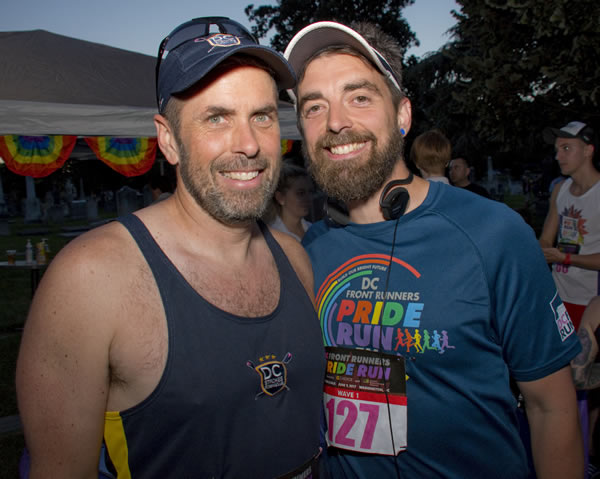Sports
Couples that play together, stay together
Meet locals who mix love and sport
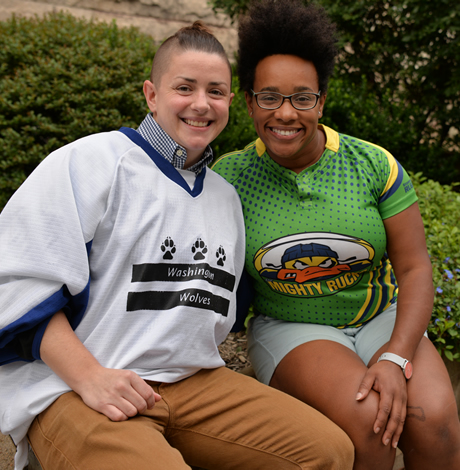
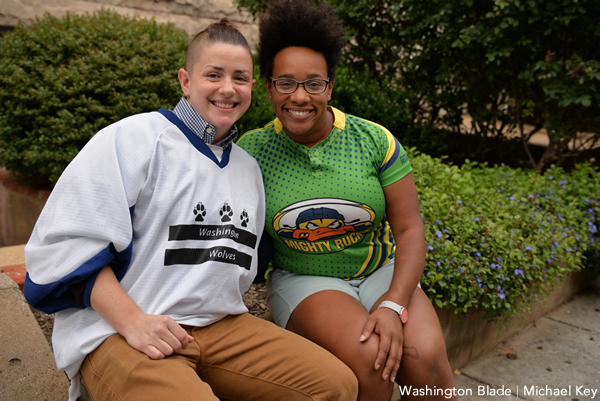
Brigid Beech and Sharifa Love met while playing for the Furies. (Washington Blade photo by Michael Key)
There are a lot of clichés about relationships that people either embrace or avoid.
Love is blind. Opposites attract. It was love at first sight.
What about ‘couples who play together, stay together’?
Meet two LGBT sports couples from D.C. who are carving their own path together by including sports in their relationships.
When Sharifa Love was attending Yale, her roommates were all rugby players and they repeatedly asked her to join their team. Love was busy with other sports and just brushed it aside. It wasn’t until the end of her senior year that they convinced her to come to a rugby practice because they were short a player for an upcoming tournament.
“During a tackle at that first practice, the other girl ended up bleeding and crying,” says Love. “I turned to my new teammates and said, ‘This is the best, I’ll be back.’”
Growing up in Rockville, Love played soccer all the way through high school along with running track. While attending Yale, she ran track for two years and then turned her focus on intramural sports such as squash and ice hockey.
The rugby experience stayed with her after the first tournament and when she returned to the D.C. area after graduation, she looked up adult rugby and joined the DC Furies in 2009.
“I love the physicality and the strategic aspect of the game. Most of my improvement has come from becoming more familiar with tactics,” Love says. “Plus, I just like hitting people; it’s a great outlet.”
Love, who is the development and communications coordinator at SMYAL, is enjoying her life as a rugger. She loves the community aspect and has played all over the country as part of the Women’s Premier League. This November her team will travel to nationals in Phoenix, Ariz.
In 2013, she began dating one of her teammates, Brigid Beech. They had been playing together for the Furies for four years.
Beech arrived in D.C. in 2005 for a job with IBM, consulting with federal clients. It was her first job out of college and as the years passed, she found herself in a rut.
“My life was terrible and I was hating everything,” says Beech. “It finally hit me that I hadn’t played sports in three years, so in 2009 I joined the Furies.”
Born in Ireland, Beech was raised in West Newbury, Mass., and in her first year of high school, she played soccer, basketball and softball. She transferred to a boarding school and changed things up by switching to cross country, ice hockey and lacrosse.
“I really enjoy the culture of team sports,” Beech says. “I have always been the ‘class clown’ and that sense of belonging is important.”
Beech took a gap year and played soccer with a team in Germany while being a part of the Congress-Bundestag Youth Exchange. During her four years at Bates College, she played rugby and captained in her senior year.
Just one year after she started dating Love, Beech would leave the Furies and return to ice hockey playing for the Washington Wolves.
“The level of play and amount of dedication required is very high in rugby,” says Beech. “Picking ice hockey back up is vital to my ability to remember that everything is not about work. I need a healthy outlet and a support system.”
Both women are now playing together again with Rogue Darts while they also maintain their separate sports.
Love said, “We had been friends all along on the Furies, and when we became a couple there was some awkwardness with the team at practices and scrimmages. We didn’t want to show up at practice and be ‘that’ couple.”
Beech replied, “I had dated other players on the team and there is a risk in introducing another layer into a safe space. It becomes high stakes. … It felt super competitive at the beginning. She is so fast and once I caught a piece of her jersey and tackled her out of bounds after the whistle blew. It wasn’t one of my finer moments. She was so pleased that she had gotten me riled up.”
While he was attending Pacific Lutheran University, Ken Kriese was interested in rowing but just couldn’t pull the trigger. He had a physical education requirement and ended up choosing aerobics instead of rowing. Kriese was a military brat growing up and none of the sports he tried, such as soccer and bowling, clicked with him. Born in Tehran, he grew up all over the place but considers Seattle home.
“I spent my junior year of college abroad in England and finally connected with rowing,” says Kriese. “I rowed at Pacific Lutheran for my senior year along with two years while completing my master’s at University of Minnesota.”
Following his doctorate work at the University of California, Davis and a short stint in Memphis, Kriese came to D.C. in 2007 where he works in migratory bird conservation for the U.S. Fish & Wildlife Service. He joined the DC Strokes Rowing Club shortly after arriving.
“Rowing is a natural fit for me because I like the team aspect. You row as a team, you race as a team, and you win as a team,” Kriese says. “DC Strokes has become my circle of friends and family. Because of what I do for a living, it is also appealing to me to be out on the water.”
While he was serving as president of the Strokes in 2015, Kriese met Jeffrey Gonzalez who was serving as the coordinator of the DC Front Runners. The Strokes volunteered at Pride Run 5K and the Front Runners volunteered at Stonewall Regatta. Numbers were exchanged.
Gonzalez moved to the area in 2007 and saw the Front Runners at the Capital Pride parade. He joined the group and has since completed 19 marathons in locations around the world.
His father was in the military and after being born in Colorado, Gonzalez grew up in Fayetteville, N.C., where he didn’t play any sports.
“I was an overweight kid and I started running in the 9th grade and lost a bunch of weight,’ says Gonzalez. “I stuck with running on my own, and ran my first marathon in my senior year of high school.”
After earning degrees at University of North Carolina at Chapel Hill and University of Michigan, Gonzalez works as a division chief at the U.S. Bureau of Labor Statistics and wrapped up his Ph.D. at the University of Maryland.
“I didn’t know anyone when I moved here and it has been great being a part of the Front Runners family,” Gonzalez says.
Kriese had completed a marathon before they met and together they have run marathons across the country. Kriese rowed at the USRowing Masters Nationals last week and both will be running at the Dopey Challenge at Walt Disney World in a few months.
“One of our first dates was a White House tour and we were in the Red Room when the same-sex marriage ruling came through,” said Gonzalez. “I decided to keep dating him even though he was wearing pleated pants.” Gonzalez added, “I am more of a solitary competitive person. He is very competitive. Sometimes I think we are just going out for a casual run, and then he goes balls out. It’s nice to have someone to get you out the door to train though I find myself being mad at him for both sides of that.”
Kriese replied, “Yes, I am a competitive person but I am competing against myself, not him. I have been told not to run faster than him, but I have. If one of us is feeling good, he can take off.”
Sports
Trans cyclist’s victory sparks outrage in conservative media
Katheryn Phillips is originally from DC
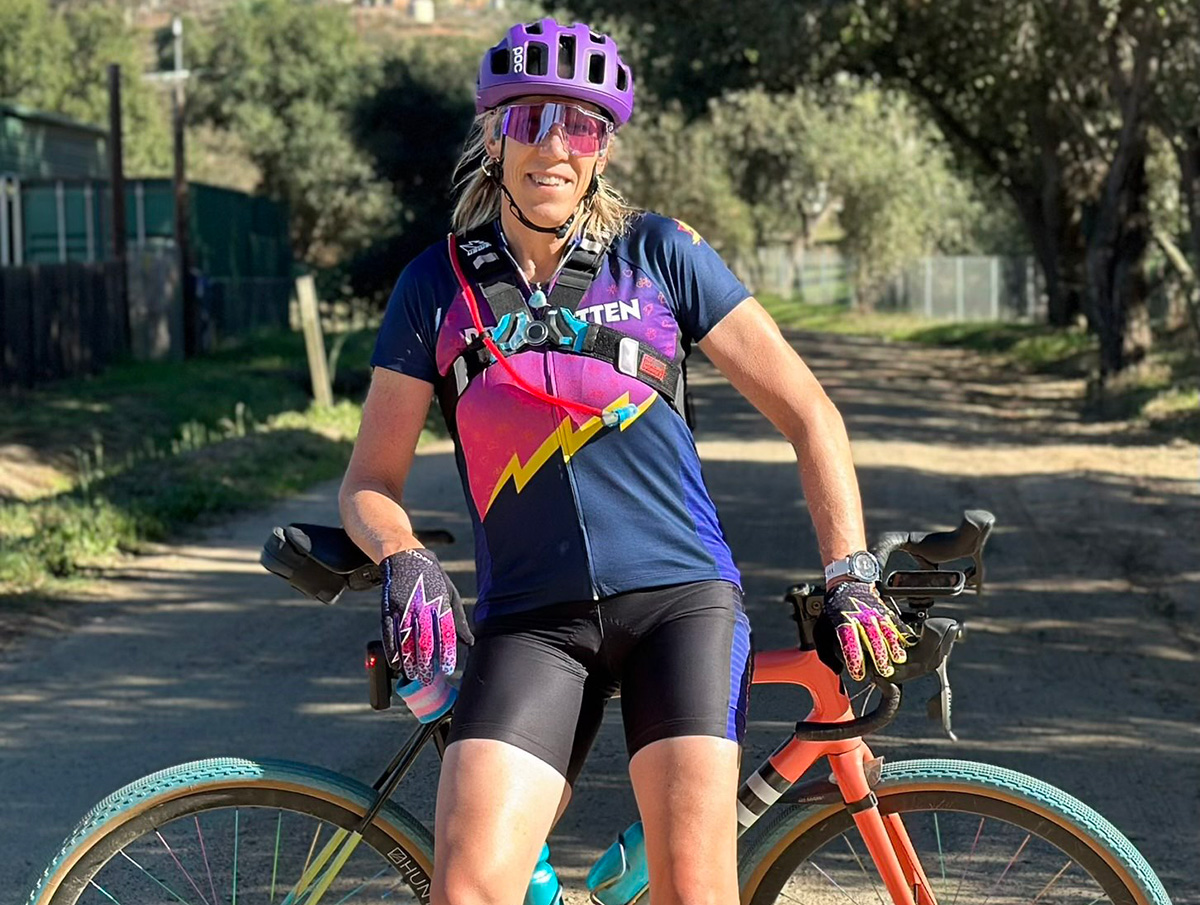
On the heels of UPenn erasing the record of the first openly transgender NCAA Division I All-American swimmer and the U.S. Supreme Court’s decision to tackle bans on trans student-athletes, right wing media is now all hot and bothered about the latest trans woman who won a cycling championship — even though she competed according to the rules.
On Tuesday, 58-year-old Katheryn Phillips finished first in USA Cycling’s Lyons Masters National Championship race for women aged 55-59, with a time of 1:42:10, according to the official results posted by the organization. The record shows her gender as “F” for female.
One second behind Phillips was Julie Peterson, with a time of 1:42:11 — as were three other cyclists: Mary Beth Grier, Andrea Cherniak-Tyson, and Carolyn Maddox.
Peterson, 57, was so outraged, she told Fox News she refused to stand on the podium in second place next to Phillips. Her story was swiftly shared by the New York Post (also owned by Fox’s parent company News Corp.), the Daily Mail, Breitbart, and other conservative media.
Both Peterson and another competitor are accusing USA Cycling of “hiding” that a transgender woman had registered to race.
“It was hidden from us. Katheryn Phillips, KJ’s name, was not on that list. And I checked it up all the way to the point of closure when we couldn’t register online anymore,” Debbie Milne told Fox.
“If I had known, I wouldn’t have spent thousands of dollars in travel and time off work to come and do a race,” Peterson said. Fox welcomed Milne, 56, who finished seventh on Tuesday, to Fox & Friends Thursday morning.
(Video courtesy of Fox News)
Peterson told Fox she did complain to USA Cycling officials prior to the race. Both Milne and Peterson referred to Phillips as a male, and with “he/him” pronouns.
“To be fair to all humans, if we want to say ‘him’ or ‘her,’ he was born a biological male, that is a fact,” Milne said. “And that is the thing that makes it an unfair advantage. Whatever has happened after that is a whole different topic.”
“I said, ‘I don’t want to race against a man,’ and they quickly scolded me and said ‘Oh, you can’t call him a man,’ and I’m like ‘Well, he is a man,’ so I was quickly scolded and corrected that it is a woman and I don’t even know what to say.”
USA Cycling did not respond to the Washington Blade’s emails requesting comment.
Phillips, who goes by Kate and by “KJ,” is a former rugby player with the D.C. Furies, who stated in the comments of a 2024 article published by Zwift Insider that she was the first out trans athlete in the U.S. to compete under the 2004 International Olympic Committee’s guidelines on trans participation.
“When USA Rugby told me about the IOC decision in 2004, I raised my hand to be included. I experience nothing but joy when I play, ride, and race,” Phillips said.
As the Blade has reported, the International Olympic Committee drastically revised those rules in 2021, and in March, Republican lawmakers in D.C. demanded the IOC ban trans female athletes from women’s sporting events altogether.
The Blade also reached out to Phillips for comment but as of press time we have not received a response. She told Zwift Insider in March 2024 she does not let those who disapprove or spread hate impact her performance or her attitude.
“I am unaffected by dissent. I love, I share joy, I am me, and I have been my authentic self for decades,” she said. It’s been reported Phillips came out in 1999, and told Zwift Insider she considers herself a lifelong cyclist.
“I’ve been on a bike for as long as I can remember,” said Phillips. “As kids, my friends and I rode all over town, we were feral kids; no cell phones, no trackers … we just roamed, and nobody got in trouble or hurt bad enough not to ride home … Scrapes/bruises/cuts were not an issue for us. In my teens, I worked for myself as a court/legal messenger, doing all of the work via my bike until I got a car. Raced BMX as a kiddo (when I mowed lawns to cover the race entry fees), I did MTB stuff (non-racing) and Sprint/Olympic Triathlons in my 30’s, and now I’m racing on Zwift, Road/Gravel, and CX in my 50s.”
In the comments section, Phillips made clear she’s not competing to win.
“I don’t do sports for victory, I do it because like many other women, I am an athlete to my core,” she said. “Unlike some, I am not there to WIN, I am there to do my best with the competitors and teammates I have around me trying to do the same…we are in it for the experience. I rejoice in their wins, and a lot of joy is reflected back to me when I have a good day.”
India
Anaya Bangar challenges ban on trans women in female cricket teams
Former Indian cricketer Sanjay Bangar’s daughter has received support

Anaya Bangar, the daughter of former Indian cricketer Sanjay Bangar, has partnered with the Manchester Metropolitan University Institute of Sport in the U.K. to assess her physiological profile following her gender-affirming surgery and undergoing hormone replacement therapy.
From January to March 2025, the 23-year-old underwent an eight-week research project that measured her glucose levels, oxygen uptake, muscle mass, strength, and endurance after extensive training.
The results, shared via Instagram, revealed her metrics align with those of cisgender female athletes, positioning her as eligible for women’s cricket under current scientific standards. Bangar’s findings challenge the International Cricket Council’s 2023 ban on transgender athletes in women’s cricket, prompting her to call for a science-based dialogue with the Board of Control for Cricket in India and the ICC to reform policies for trans inclusion.
“I am talking with scientific evidence in my hand,” Bangar said in an interview posted to her Instagram page. “So, I hope, this makes an impact and I will be hoping to BCCI and ICC talking with me and discussing this further.”
On Nov. 21, 2023, the ICC enacted a controversial policy barring trans women from international women’s cricket. Finalized after a board meeting in Ahmedabad, India, the regulation prohibits any trans player who has experienced male puberty from competing, irrespective of gender-affirming surgery or hormone therapy. Developed through a 9-month consultation led by the ICC’s Medical Advisory Committee, the rule aims to safeguard the “integrity, safety, and fairness” of women’s cricket but has drawn criticism for excluding athletes like Canada’s Danielle McGahey, the first trans woman to play internationally. The policy, which allows domestic boards to set their own rules, is slated for review by November 2025.
Bangar shared a document on social media verifying her participation in a physiological study at the Manchester Metropolitan University Institute of Sport, conducted from Jan. 20 to March 3, 2025, focused on cricket performance. The report confirmed that her vital metrics — including hemoglobin, blood glucose, peak power, and mean power — aligned with those of cisgender female athletes. Initially, her fasting blood glucose measured 6.1 mmol/L, slightly above the typical non-diabetic range of 4.0–5.9 mmol/L, but subsequent tests showed it normalized, reinforcing the study’s findings that her physical profile meets female athletic standards.
“I am submitting this to the BCCI and ICC, with full transparency and hope,” said Bangar. “My only intention is to start a conversation based on facts not fear. To build space, not divide it.”
In a letter to the BCCI and the ICC, Bangar emphasized her test results from the Manchester Metropolitan University study. She explained that the research aimed to assess how hormone therapy had influenced her strength, stamina, hemoglobin, glucose levels, and overall performance, benchmarked directly against cisgender female athletic standards.
Bangar’s letter to the BCCI and the ICC clarified the Manchester study was not intended as a political statement but as a catalyst for a science-driven dialogue on fairness and inclusion in cricket. She emphasized the importance of prioritizing empirical data over assumptions to shape equitable policies for trans athletes in the sport.
Bangar urged the BCCI, the world’s most influential cricket authority, to initiate a formal dialogue on trans women’s inclusion in women’s cricket, rooted in medical science, performance metrics, and ethical fairness. She called for the exploration of eligibility pathways based on sport-specific criteria, such as hemoglobin thresholds, testosterone suppression timelines, and standardized performance testing. Additionally, she advocated for collaboration with experts, athletes, and legal advisors to develop policies that balance inclusivity with competitive integrity.
“I am releasing my report and story publicly not for sympathy, but for truth. Because inclusion does not mean ignoring fairness, it means measuring it, transparently and responsibly,” said Bangar in a letter to the BCCI. “I would deeply appreciate the opportunity to meet with you or a representative of the BCCI or ICC to present my findings, discuss possible policy pathways, and work towards a future where every athlete is evaluated based on real data, not outdated perceptions.”
Before her transition, Bangar competed for Islam Gymkhana in Mumbai and Hinckley Cricket Club in the U.K., showcasing her talent in domestic cricket circuits. Her father, Sanjay Bangar, was a dependable all-rounder for the Indian national cricket team from 2001 to 2004, playing 12 test matches and 15 One Day Internationals. He later served as a batting coach for the Indian team from 2014 to 2019, contributing to its strategic development.
Cricket in India is a cultural phenomenon, commanding a fanbase of more than 1 billion, with more than 80 percent of global cricket viewership originating from the country.
The International Cricket Council, the sport’s governing body, oversees 12 full member nations and more than 90 associate members, with the U.S. recently gaining associate member status in 2019 and co-hosting the 2024 ICC Men’s T20 World Cup. The BCCI generated approximately $2.25 billion in revenue in the 2023–24 financial year, primarily from the Indian Premier League, bilateral series, and ICC revenue sharing. The ICC earns over $3 billion from media rights in India alone for the 2024–27 cycle, contributing nearly 90 percent of its global media rights revenue, with the BCCI receiving 38.5 percent of the ICC’s annual earnings, approximately $231 million per year.
Women’s cricket in India enjoys a growing fanbase, with over 300 million viewers for the Women’s Premier League in 2024, making it a significant driver of the sport’s global popularity. The International Cricket Council oversees women’s cricket in 12 full member nations and over 90 associate members, with the U.S. fielding a women’s team since gaining associate status in 2019 and competing in ICC events like the 2024 Women’s T20 World Cup qualifiers. The BCCI invests heavily in women’s cricket, allocating approximately $60 million annually to the WPL and domestic programs in 2024–25, while contributing to the ICC’s $20 million budget for women’s cricket development globally. India’s media market for women’s cricket, including WPL broadcasting rights, generated $120 million in 2024, accounting for over 50 percent of the ICC’s women’s cricket media revenue.
“As a woman, I feel when someone says that they are women, then they are, be trans or cis. A trans woman is definitely the same as a cis woman emotionally and in vitals, and specially, when someone is on hormone replacement therapy. Stopping Anaya Bangar from playing is discrimination and violation of her rights. It is really sad and painful that every trans woman need to fight and prove their identity everywhere,” said Indrani Chakraborty, an LGBTQ rights activist and a mother of a trans woman. “If ICC and BCCI is stopping her from playing for being transgender, then I will say this to be their lack of awareness and of course the social mindsets which deny acceptance.”
Chakraborty told the Blade that Bangar is an asset, no matter what. She said that the women’s cricket team will only benefit by participation, but the discriminating policies are the hindrance.
“Actually the transgender community face such discrimination in every sphere. In spite of being potent, they face rejection. This is highly inhuman. These attitudes is regressive and will never let to prosper. Are we really in 2025?,” said Chakraborty. “We, our mindset and the society are the issues. We, as a whole, need to get aware and have to come together for getting justice for Anaya. If today, we remain silent, the entire community will be oppressed. Proper knowledge of gender issues need to be understood.”
The BCCI and the International Cricket Council have not responded to the Blade’s repeated requests for comment.
Sports
English soccer bans transgender women from women’s teams
British Supreme Court last month ruled legal definition of woman limited to ‘biological women’
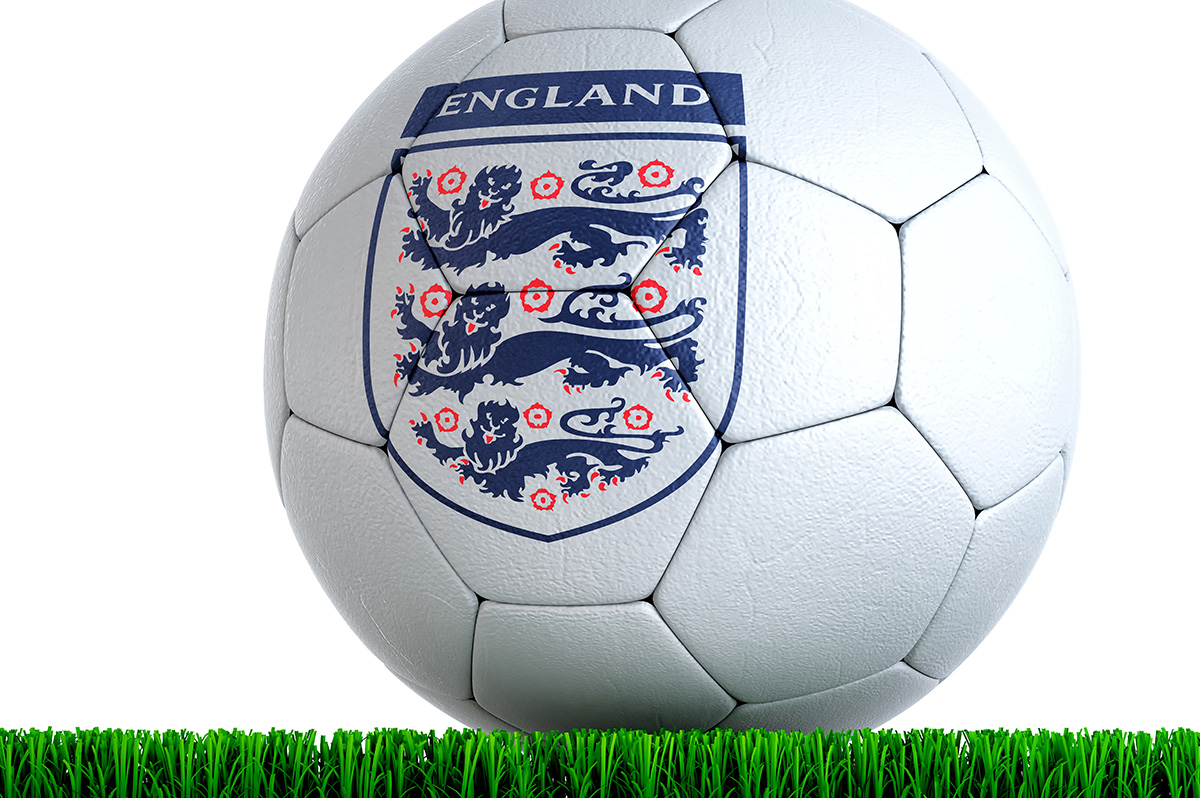
The organization that governs English soccer on Thursday announced it will no longer allow transgender women to play on women’s teams.
The British Supreme Court on April 16 ruled the legal definition of a woman is limited to “biological women” and does not include trans women. The Football Association’s announcement, which cites the ruling, notes its new policy will take effect on June 1.
“As the governing body of the national sport, our role is to make football accessible to as many people as possible, operating within the law and international football policy defined by UEFA (Union of European Football Associations) and FIFA,” said the Football Association in a statement that announced the policy change. “Our current policy, which allows transgender women to participate in the women’s game, was based on this principle and supported by expert legal advice.”
“This is a complex subject, and our position has always been that if there was a material change in law, science, or the operation of the policy in grassroots football then we would review it and change it if necessary,” added the Football Association.
The Football Association also acknowledged the new policy “will be difficult for people who simply want to play the game they love in the gender by which they identify.”
“We are contacting the registered transgender women currently playing to explain the changes and how they can continue to stay involved in the game,” it said.
The Football Association told the BBC there were “fewer than 30 transgender women registered among millions of amateur players” and there are “no registered transgender women in the professional game” in England, Scotland, Wales, and Northern Ireland.
The Scottish Football Association, which governs soccer in Scotland, is expected to also ban trans women from women’s teams.

